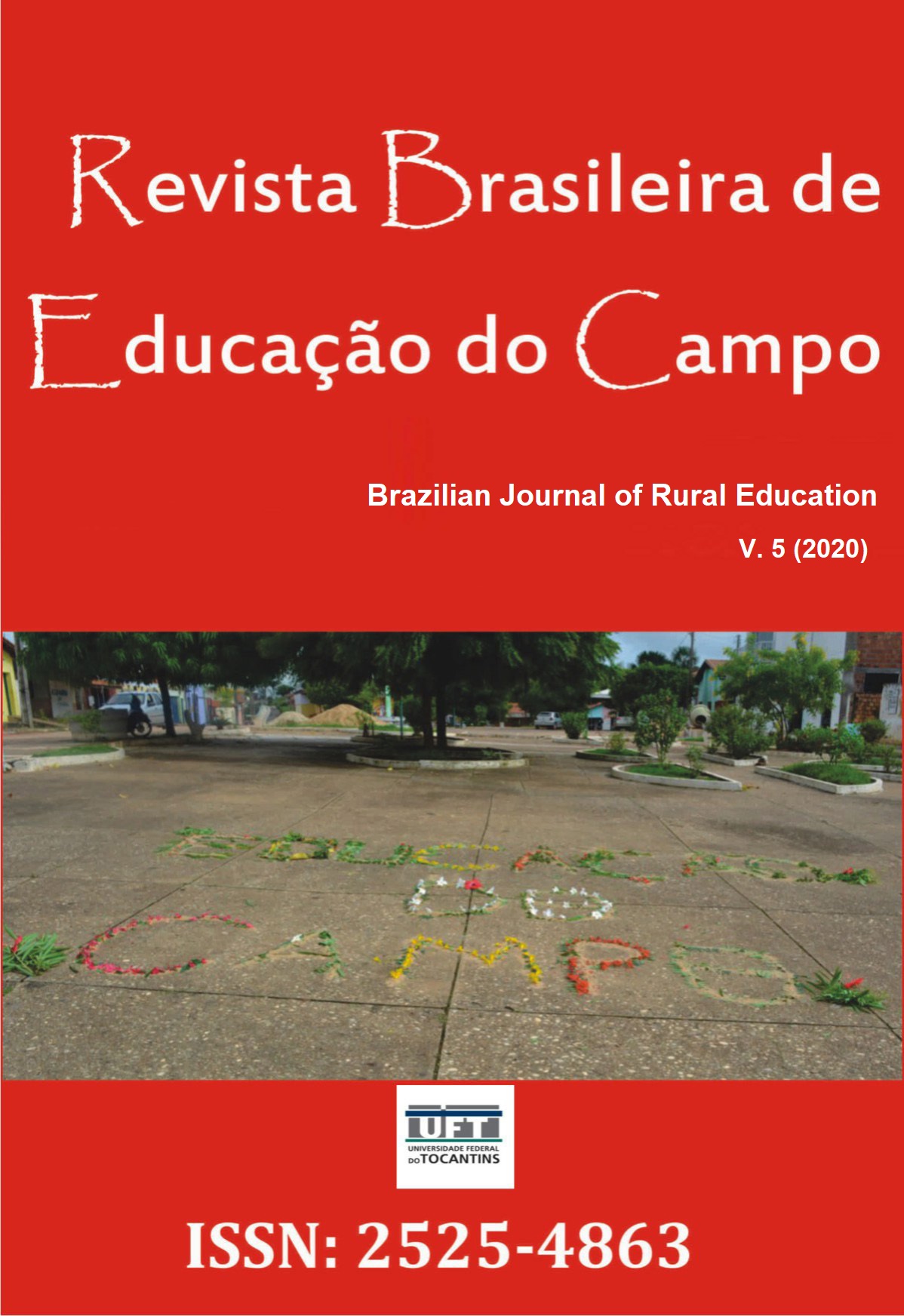Alternation system in the teacher major course of Rural Education: an experience of the Federal University of Goiás / Regional Catalão
DOI:
https://doi.org/10.20873/uft.rbec.e6192Abstract
ABSTRACT. The Teacher Major Course of Rural Education (LEdoC) work in Alternation Regime, with the development of actions that stimulate the systematic relationship of theory-practice-theory, through alternating training times in University Time (TU) and Community Time (TC). The objective of this work is to analyses one experience of the TC at Federal University of Goiás - Regional Catalão, carried out in the Vista Alegre Settlement in Cristalina (GO). About 250 families live in the settlement. What marks the lives of these individuals is a process of struggle and resistance in conquering and remaining in these territories, always fighting for social policies that meet their social needs. With the TC, the students come to better understand the structures that surround the life of the subjects of the field, with their infinite particularity and ways of life. In addition, there are changes of perception and a reflection on the pedagogical theories themselves and the socio-educational thoughts. We can conclude then that TC is essential in the process of training future rural teachers.
Downloads
Literaturhinweise
Arroyo, M., Caldart, R. S., & Molina, M. (2004). Por uma Educação do Campo. Petrópolis: Vozes.
Arroyo, M. G. (s/a). Ações Coletivas e Conhecimento: Outras Pedagogias?. Universidade Popular. Recuperado de http://www.universidadepopular.org/site/media/leituras_upms/Acoes_Coletivas_e_Conhecimento__30-11-09.PDF
Antunes-Rocha, M. I., & Martins, M. F. A. (2011). Diálogo entre teoria e prática na Educação do Campo: Tempo Escola/Tempo Comunidade e alternância como princípio metodológico para organização dos tempos e espaços no curso de Licenciatura Ed. do Campo. In Molina, M. C., Sá, L. M. (Orgs.). Licenciaturas em Educação do Campo: registros e reflexões a partir das experiências piloto (UFMG; UnB; UFBA e UFS) (pp. 213-228). Belo Horizonte. Autêntica.
Brasil, Ministério da Saúde. (2011). Portaria n 2.914, de 12 de dezembro de 2011. Dispõe sobre os procedimentos de Controle e de vigilância da qualidade da água para consumo humano e seu padrão de potabilidade.
Brasil, Ministério do Desenvolvimento Agrário. (2014). Licenciaturas em Educação do Campo e o ensino de Ciências Naturais: desafios à promoção do trabalho docente interdisciplinar. Brasília: MDA.
Costa, E. R., Alves, M. Z., & Faleiro W. (2015). A Interdisciplinaridade no Curso De Educação Do Campo: O Caso da UFG Catalão. Enciclopédia Biosfera, Centro Científico Conhecer, 11(20), 47-55.
Veiga J. E. (2003). Cidades Imaginárias. O Brasil é menos urbano do que se calcula. Campinas: Editora Autores Associados.
Faleiro, W., & Farias, M. N. (2016). Tessituras na implantação da licenciatura em Educação do Campo na Universidade Federal de Goiás/regional Catalão. Cadernos CIMEAC, 6(2), 78-97. https://doi.org/10.18554/cimeac.v6i2.1696
Filho, A. E. (2012). Despejos. In Caldart, R. S. et al. (Orgs.). Dicionário da Educação do Campo (pp. 212-217). Rio de Janeiro, São Paulo: Expressão Popular.
Leite, S. P. (2012). Assentamento Rural. In Caldart, R.S. et al. (Orgs.). Dicionário da Educação do Campo (pp. 110-114). Rio de Janeiro, São Paulo: Expressão Popular.
Melgarejo, L. (2001). O desenvolvimento, a reforma agrária e os assentamentos - Espaços para a contribuição de todos. Agroecol. e Desenv. Rur. Sustent., 2(4), 58-68.
Molina, M. C. (2015). Expansão das licenciaturas em Educação do Campo: desafios e potencialidades. Educar em Revista, 1(55), 145-166. https://doi.org/10.1590/0104-4060.39849
Molina, M. C., & Sá, L. M. (2011). Licenciaturas em Educação do Campo: Registros e Reflexões a partir das Experiências-Piloto. Belo Horizonte: Autêntica Editora.
Tardin, J. M. (2012). Cultura Camponesa. In Caldart, R. et al. (Org.). Dicionário da Educação do Campo (pp. 180-188). Rio de Janeiro: Expressão Popular.
Zen, E. L., & Ferreira, A. R. L. (2012). Movimento dos Atingidos por Barragens (MAB). In Caldart, R. et al. (Orgs.). Dicionário da Educação do Campo (pp. 489-493). Rio de Janeiro: Expressão Popular.
Veröffentlicht
Zitationsvorschlag
Ausgabe
Rubrik
Lizenz
Creative Commons Attribution License
Creative Commons Attribution License
Proposal for Copyright Notice Creative Commons
1. Policy Proposal to Open Access Journals
Authors who publish with this journal agree to the following terms:
A. Authors retain copyright and grant the journal right of first publication with the work simultaneously licensed under the Creative Commons Attribution License that allows sharing the work with recognition of its initial publication in this journal.
B. Authors are able to take on additional contracts separately, non-exclusive distribution of the version of the paper published in this journal (ex .: publish in institutional repository or as a book), with an acknowledgment of its initial publication in this journal.
C. Authors are permitted and encouraged to post their work online (eg .: in institutional repositories or on their website) at any point before or during the editorial process, as it can lead to productive exchanges, as well as increase the impact and the citation of published work (See the Effect of Open Access).














